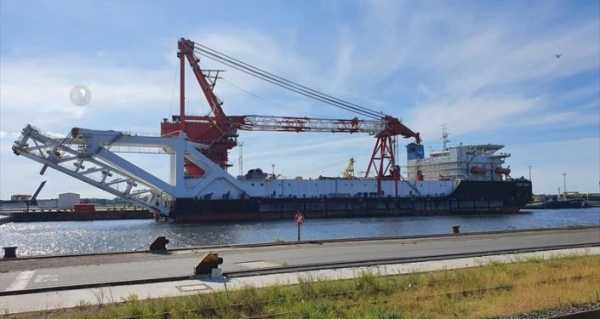
On Thursday, six days after Nord Stream 2 AG announced that it would resume construction of the pipeline, US lawmakers unveiled the 2021 National Defense Authorization Act, targeting the mammoth energy project with new sanctions. President Trump, however, has threatened to veto the 2021 NDAA over an unrelated matter.
Germany’s Federal Maritime and Hydrographic Agency has revealed that the Fortuna – a Russian-flagged pipelaying crane vessel, will be engaged in pipelaying activity in German waters.
According to maritime portal MarineTraffic, the Fortuna is currently located near the port of Wismar (a German port city about 200 km northwest of Berlin).
Earlier, MarineTraffic data indicated that Russia’s Akademik Cherskiy pipelayer was anchored some 150 km off the port of Mukran, Nord Stream 2’s logistical base, after leaving the Russian port of Kaliningrad on Thursday. Several supply vessels, including the Umka, another Russian-flagged ship, are thought to be situated nearby.
On December 1, the agency confirmed that the permit for laying the pipeline in German waters remains valid through the month of December, and that a request to extend it through the period of January to April was under consideration.

The Russian pipe-laying ship ‘Akademik Tscherski’ which is on deployment for the further construction of the Nord Stream 2 Baltic Sea pipeline is moored at the port of Mukran on the island of Ruegen, Germany, Tuesday, Sept. 8, 2020
New Sanctions
On Thursday, US lawmakers finalised the 2021 National Defence Authorisation Act, a massive $740 billion defence spending package which also includes sanctions against Nord Stream 2, and against Turkey over the latter’s decision to buy Russian-made S-400 air defence systems.
The 2021 NDAA, which President Trump has threatened to veto unless it overhauls existing liability protections for tech companies, echoes the 2020 NDAA, which slapped sanctions on Nord Stream 2 last December, prompting Swiss pipelaying contractor Allseas to pull out of the project with just 160 km (6 percent) of the 1,230 km pipeline left to build. Russia’s Gazprom reacted by sending the Akademik Cherskiy on a round-the-world journey from the Russian Far East to the Baltic Sea to prepare to finish the project.
Moscow slammed the new proposed sanctions, describing them as “nothing but a manifestation of unfair competition”. The European Commission condemned US plans to expand sanctions, calling them a violation of international law and warning that Brussels would be prepared to defend its interests if Washington moved forward with its plans. Prior to sanctions, the US repeatedly proposed replacing Russian gas deliveries with more expensive US LNG supplies.
Project Crucial to German Energy Security
Nord Stream 2 is a $10.5 billion energy infrastructure project between Gazprom and Western European energy concerns Uniper, Wintershall, OMV, Engie, and Royal Dutch Shell. Once completed, the pipeline network will double the existing 55 billion cubic meters of gas per year capacity of the Nord Stream network to 110 billion cubic meters, and turn Germany into an energy hub for deliveries further west.
German officials and industrial magnates have repeatedly pointed to the importance of Nord Stream 2 as a means to guarantee Berlin’s energy security amid the country’s phase-out of nuclear and coal power. On Friday, the German Eastern Business Association confirmed that up to 70 percent of the Nord Stream 2 network could be filled with hydrogen, a clean fuel that, when consumed in fuel cells, produces only water as a byproduct.
Sourse: sputniknews.com






